Protecting customer data is a top priority for any online business. Imagine a customer signing up for your newsletter, trusting you with their email, and expecting you’ll only use their information as promised.
That’s where a privacy policy comes into play.
A privacy policy for email is a legal document that explains how you collect, use, and protect personal information through email—like a contract that reassures customers their trust is in good hands.
Below, I’ll share how you can create one that not only checks off legal boxes but also makes your customers feel confident about trusting you with their info.
- You need a clear privacy policy to explain how you collect and use email data.
- Always provide an easy way for customers to opt out of your emails. Clearly explain this process in your policy.
- If you use third-party email services, your policy must disclose this. Outline how they handle and protect your customers’ data.
Table of Contents
PRO TIP: Take the hassle of writing your own privacy policy away with our privacy policy generator trusted by over 200,000 businesses. It’ll save you hours of work and possible costly legal mistakes.
Why Do You Need an Email Clause in Your Privacy Policy?
You need an email clause in your privacy policy because it explains how you handle your customers’ personal information. This builds trust and ensures you’re compliant with a number of privacy laws.
Building Customer Trust
When customers sign up for your emails, they’re trusting you with their personal information. By having an email clause, you show them exactly how you’re protecting that information, which can make them feel more comfortable doing business with you.
Staying Legally Compliant
Privacy laws like GDPR and CCPA require you to be transparent about how you collect and use customer data. Including an email clause helps ensure you’re following the rules, so you don’t run into legal trouble down the road.
Setting Clear Expectations
With an email clause, you can let customers know what they can expect from your emails. Whether you’re sending newsletters, promotions, or updates, they’ll know exactly what they signed up for, reducing the chances of any surprises or complaints.
Protecting Your Business
If a customer ever questions how you’re using their email, your privacy policy acts as a backup. It can protect you from potential disputes by clearly outlining how your business’s privacy and security measures, helping avoid misunderstandings.
Improving Transparency
Customers appreciate businesses that are upfront about their practices. Being clear about your email practices in your privacy policy shows that you value transparency, which can lead to stronger customer relationships and loyalty.
Laws That Require an Email Marketing Clause in Your Privacy Policy
To avoid fines and legal issues, it’s important to know which laws require you to include an email marketing clause in your privacy policy. Here are the key regulations you need to comply with when handling customer data in email marketing:
GDPR
The General Data Protection Regulation (GDPR) is a comprehensive law designed to protect the data privacy rights of individuals within the European Union.
Under GDPR, collecting a customer’s email address counts as handling personal data. So, before you add someone to your email list, you need their clear permission. You also have to explain how you’ll use their email.
For compliance, your privacy policy should also include a section that tells users how to unsubscribe or request their data to be deleted, like providing a simple “unsubscribe” link or contact details for data removal requests.
Here’s an example email showing this:

CAN-SPAM Act
The CAN-SPAM Act is a U.S. federal law that sets rules for commercial email. It aims to protect consumers from unsolicited commercial email, commonly known as spam.
Under the CAN-SPAM Act, businesses must include certain information in their emails, such as:
- A clear and conspicuous privacy act notice;
- A physical postal address; and
- An unsubscribe mechanism that allows recipients to opt out of future emails.
Additionally, it prohibits deceptive or misleading subject lines and requires businesses to indicate that the email is a commercial message.
CCPA
The CCPA is a privacy law that applies to businesses that do business in California and meet certain criteria regarding revenue or the number of California residents whose personal information they collect.
Under the CCPA, consumers have the right to:
- Know what personal information is collected about them;
- Delete their data; and
- Opt out of the sale of their personal information.
This includes the collection and use of email addresses for marketing purposes. To comply, your privacy policy should include a section that explains these rights and how customers can exercise them, making it clear and easy for them to do so.
PRO TIP: Create a “Do Not Sell My Personal Information” page that allows customers to easily opt out. Link this page clearly in your privacy policy for transparency and easy access.
CASL
Canada’s Anti-Spam Law (CASL) is all about making sure people don’t get unwanted emails. As an online business owner, this means you need permission before sending users any promotional emails.
You can either ask them directly or if they’re already a customer, you can rely on that relationship. Your emails must also include your business details, like your name and address, and an easy way for people to unsubscribe.
For compliance, your privacy policy must explain how you get consent and offer a simple opt-out option. Use our free privacy policy generator to create a solid, trustworthy document.
Third-Party Email Clients’ Privacy Policy Requirements
Do you use third-party email marketing services to send marketing emails? While your privacy policy outlines your email marketing practices, these third-party providers must also have a clear and solid privacy policy in place.
Here are some key things to consider:
- Data Ownership: Who owns the data collected through your email marketing campaigns? Does the third-party provider have access to and control over your customers’ information?
- Data Security: What measures does the provider take to protect your customers’ data from unauthorized access or breaches? Are their security practices up to date and compliant with relevant data protection laws?
- Data Usage: How does the provider use your customers’ data? Are there any limitations on how the data can be used, and have you been notified of any changes to these policies?
- Subprocessors: Does the provider work with any subcontractors or subprocessors who have access to your customers’ data? If so, ensure that these third parties also have appropriate privacy policies in place.
PRO TIP: Before signing up with a third-party email provider, ask if they allow audits or provide detailed reports on their data security practices.
9 Key Components of a Privacy Policy for Email Marketing
To make sure you’re covering all the requirements for email marketing within your privacy policy, it’s important to include certain key components that protect both your business and your customers’ data.
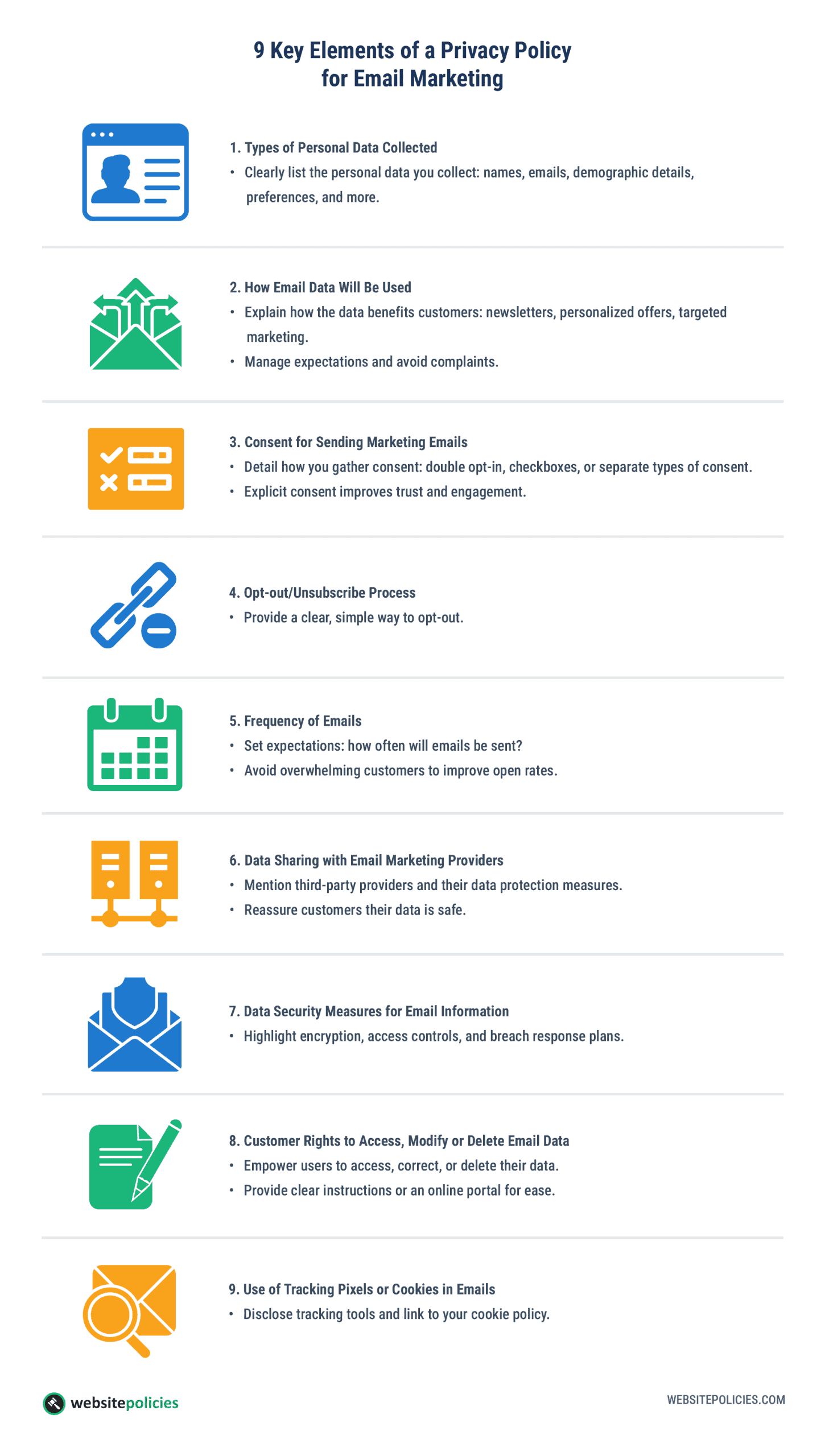
1. Types of Personal Data Collected
An effective email privacy policy must specify the types of personal data being collected—most commonly, names and email addresses. Beyond that, if you’re collecting additional details through sign-up forms, be sure to list them as well.
This may include:
- Demographic information (age, gender, location)
- Purchase history or preferences
- Job titles or company names
- Interests or hobbies (from surveys or forms)
- Social media profiles (if integrated)
People like to know exactly what information you’re gathering and why. By being clear, you build trust and show that your business respects their privacy. It also keeps you compliant with data privacy laws.
2. How Email Data Will Be Used
The marketing clause of your privacy policy should clearly outline why you’re gathering this information and how it will benefit the customer.
For example, if you’re using email data for specific purposes, like sending personalized offers, updates on new products, or a weekly email newsletter, say that. If you plan to use it for targeted marketing or analytics, mention that, too.
Being upfront helps manage customer expectations, reducing the chance of complaints or opt-outs, and ensures you’re legally covered if customers ask how their data is being handled.
3. Consent for Sending Marketing Emails
Your privacy policy should clearly state how you obtain consent from customers. For instance, if you’re collecting emails for direct marketing purposes, like promotions or updates, you need to make sure users actively agree to receive these communications.
You can do this in several ways, including:
- Double Opt-In: Require customers to confirm their subscription after initially signing up for your email list. This helps ensure only those who genuinely want to receive your emails are added to your list.
- Checkboxes or Opt-In Options: Provide a clear and visible checkbox or option for customers to consent to receive marketing emails when they sign up for the newsletter, for example.
- Separate Consent for Different Types of Marketing: If you send different types of marketing emails (e.g., promotional emails, newsletters), you may need to obtain separate consent for each type.
Here is Ancestry.com’s sign-up form where they remind users about receiving marketing emails when they create an account:
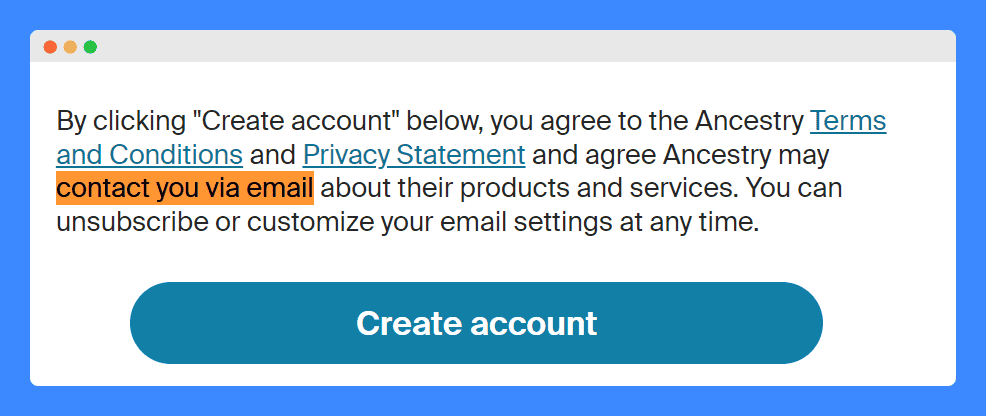
Obtaining explicit consent demonstrates respect for their privacy. Aside from that, it helps ensure your email marketing efforts are more effective, as you’re reaching people who genuinely want to hear from you.
4. Opt-out/Unsubscribe Process
Just as important as getting consent is providing a clear and simple opt-out option. In my case, I always include an unsubscribe link in the email. I also make sure my privacy policy explains how they can unsubscribe from email marketing and data collection.
My advice? Make the process as straightforward as it can be—no hoops to jump through. This shows respect for your customers’ preferences, which helps maintain a positive relationship, even if they opt-out.
PRO TIP: Process unsubscribe requests within a reasonable timeframe. It helps you avoid potential legal issues and maintain a clean and engaged email list.
5. Frequency of Emails
While not explicitly required by all data protection laws, it’s generally considered best practice to ensure that your privacy policy provides information about the frequency of emails your customers can expect to receive.
Doing this helps set expectations and avoid overwhelming customers with excessive emails. It can also help improve your email open and click-through rates, as customers are less likely to unsubscribe if they know what to expect.
This should apply to all email marketing activities, including newsletters, promotional emails, and any other communications sent to your customers.
6. Data Sharing with Email Marketing Providers
Many businesses use third-party services to manage their email campaigns, which means customer data is being shared with these providers.
It’s important that your privacy policy explains who has access to this data and how it’s being protected. By doing so, you reassure customers that their personal information is safe and handled responsibly, even when shared with outside providers.
7. Data Security Measures for Email Information
Including data security measures for email information in your privacy policy is more important than ever, especially considering the rise in phishing attacks.
A recent analysis of 183 million phishing simulations by Proofpoint found that nearly one in six recipients failed when faced with a phishing email containing a suspicious attachment.
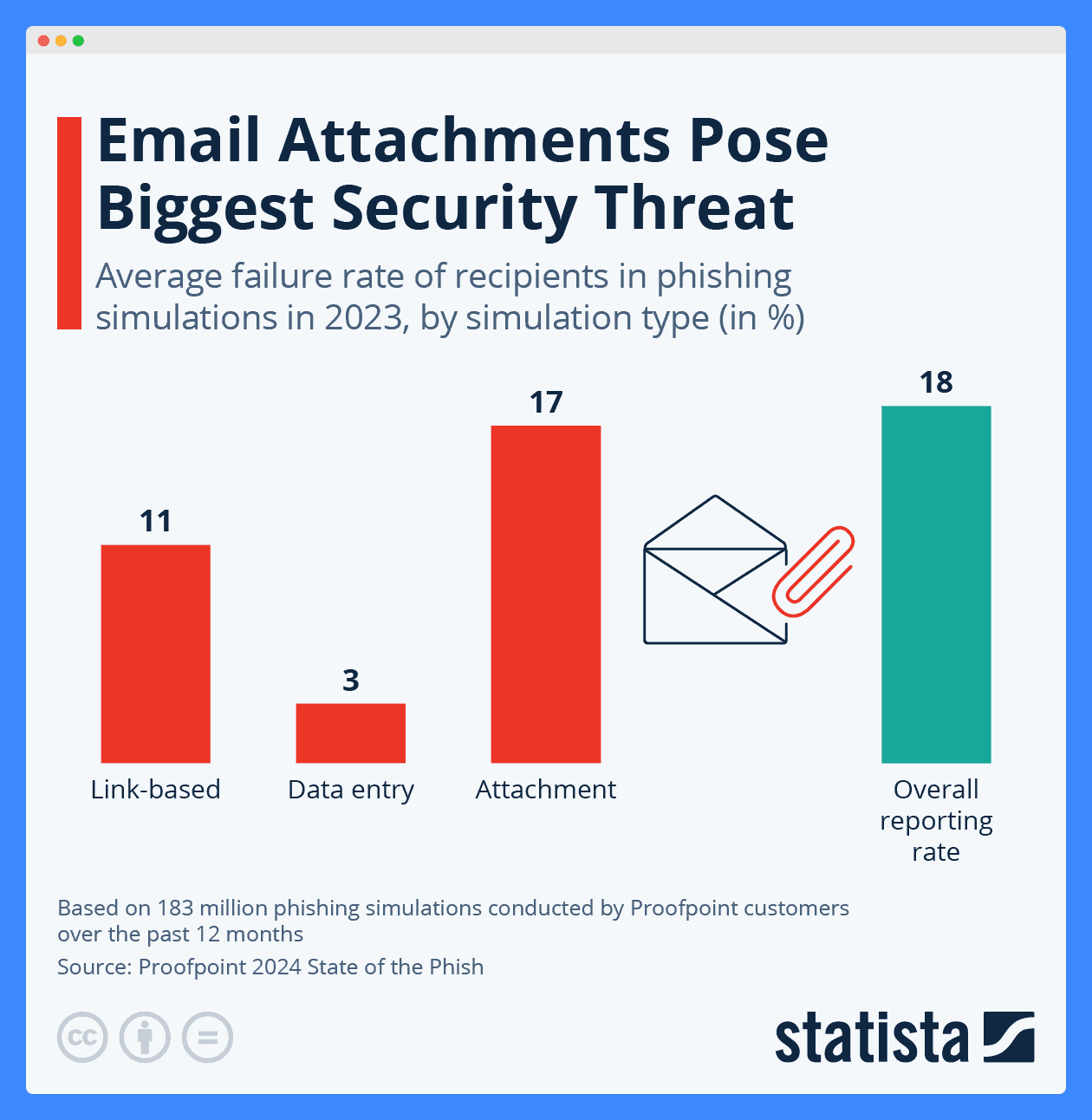
Given that email is often a target for such attacks, it’s crucial to reassure your customers their information is secure. Here are some data security measures you might consider:
- Encryption: Using encryption to protect email data both in transit and at rest.
- Access Controls: Implementing strong access controls to limit who can access your customers’ email information.
- Incident Response Plan: Having a plan in place to respond to data breaches or other security incidents.
It is also important to conduct regular security audits to identify and address potential vulnerabilities. You can partner with a cybersecurity firm or use specialized tools like SecurityScorecard or Qualys to ensure your data protection measures are up to date.
8. Customer Rights to Access, Modify or Delete Email Data
In practice, this means your customers should be able to view the data you’ve collected about them, request changes if the information is outdated or incorrect, or ask for their data to be completely deleted.
As mentioned, many laws require businesses to respect these consumer privacy rights. Plus, highlighting them in your privacy policy gives customers confidence that they have control over their data.
PRO TIP: Offer clear instructions on how customers can exercise their rights. You can do this through an online portal or by making them contact your support team directly.
Here’s how Crunchbase reminds its users how to do just that in its privacy policy:

9. Use of Tracking Pixels or Cookies in Emails
If you use tracking pixels or cookies in your emails, it’s a good idea to mention this in your privacy policy and link to your cookie policy for more details.
These tools help track things like who opened your emails or clicked on a link, which is great for understanding how your emails perform. However, laws like GDPR require you to inform customers about this and, in some cases, get their consent.
By linking to your cookie policy, you can explain everything in one place without overloading your main privacy policy with too much detail.
How To Create a Privacy Policy Clause for Email Marketing
To create a well-rounded privacy policy clause for email marketing, follow these steps:
Step 1: Research Data Privacy Laws
Before writing, familiarize yourself with the laws that apply to your business, like the ones we listed earlier. This ensures your clause complies with legal requirements for email marketing.
Step 2: Gather Information
Review your current privacy policy and any other relevant documents. Identify your specific email marketing activities, including data collection methods, usage, and sharing practices.
Step 3: Draft the Privacy Policy Clause
Write the clause in plain language that’s easy for customers to understand. Address key components like consent, data collection, usage, sharing, security, and customer rights. Tailor the clause to your specific email marketing activities and data handling processes.
Step 4: Post a Link to Your Privacy Policy in the Footer
Ensure visibility by placing a link to your privacy policy in the footer of all web pages and email campaigns. This makes it easy for customers to access the policy at any time.
Always post a privacy policy link where customers sign up for newsletters or make purchases, so they know how their email data will be handled before they submit.
Step 5: Regularly Update Your Privacy Policy
As your business and legal requirements change, update your privacy policy to reflect new practices or regulations. Notify your customers when changes are made to maintain transparency.
Email Privacy Policy Examples You Can Learn From
Looking for real-world inspiration to see how businesses handle their email marketing policies? Below are some email privacy policy examples that can give you ideas on how to structure your own policy and ensure it’s clear, transparent, and user-friendly.
Flodesk
In this privacy policy email sample, Flodesk outlines the types of personal information they collect, including business contact details, marketing preferences, and payment information.
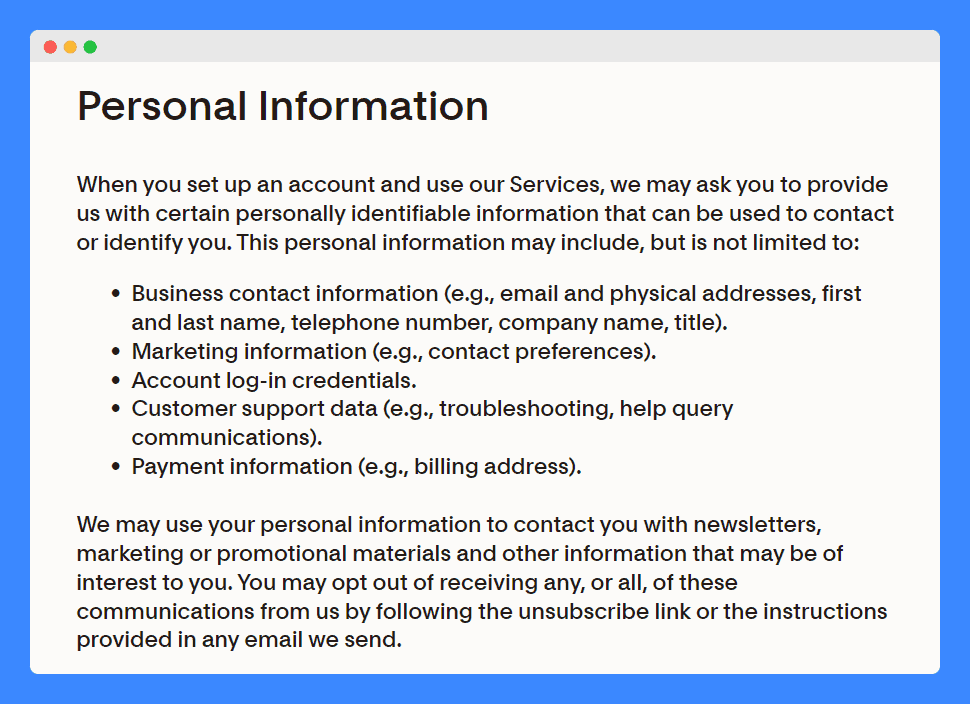
They also make it clear that this data may be used to send newsletters, marketing materials, or promotional offers.
What’s important here is the transparency around how they use personal data and the fact that they provide an easy way to opt out of these communications, either through an unsubscribe link or instructions within the email.
Social Media Examiner
In its privacy policy, Social Media Examiner clearly outlines how it uses data collection via email marketing through its email service provider, Drip.
This includes gathering contact information, tracking newsletter performance, and monitoring user behavior, such as which pages are visited and which links are clicked in the email.
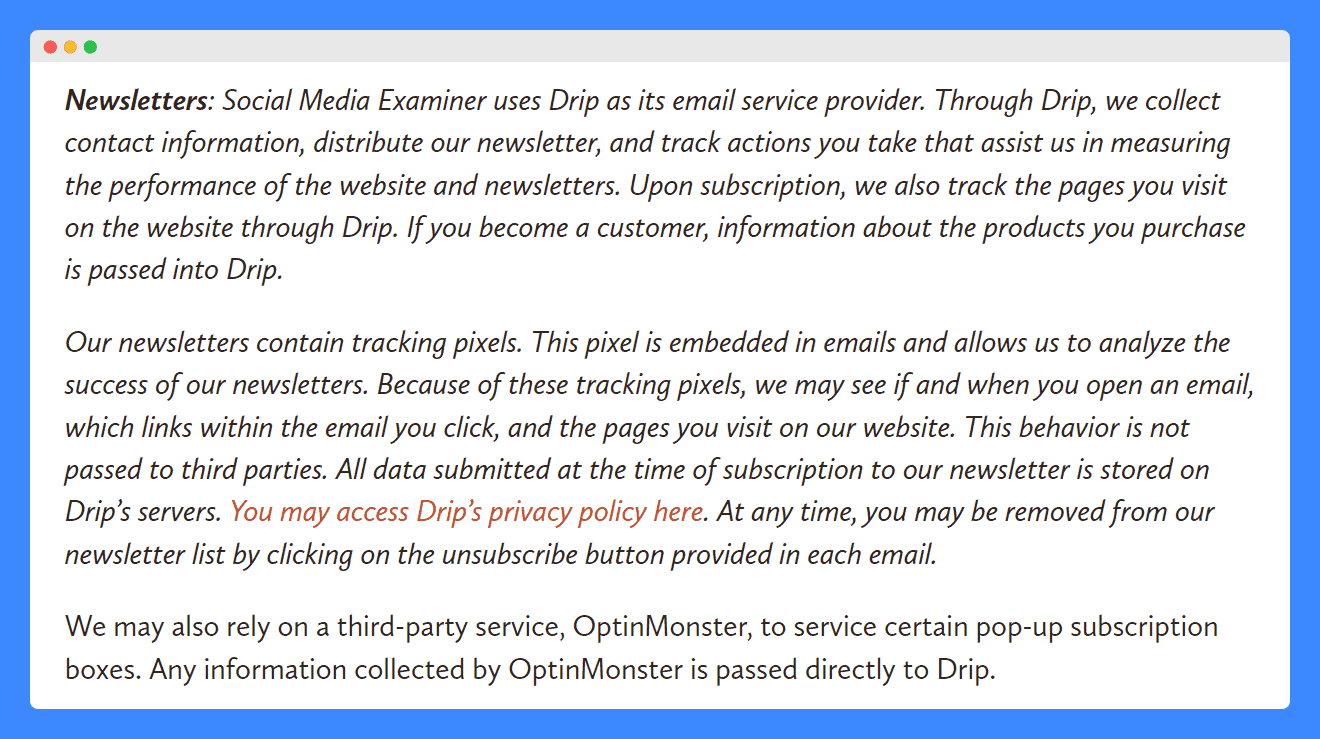
The policy also mentions the use of tracking pixels to analyze email engagement, while ensuring that this information is not shared with third parties. A clear explanation of these practices provides transparency and control for their users.
Grammarly
Grammarly’s example of a privacy policy provides a detailed explanation of their data collection and usage practices, including their email marketing activities. Users are also informed how they can exercise their data privacy rights:
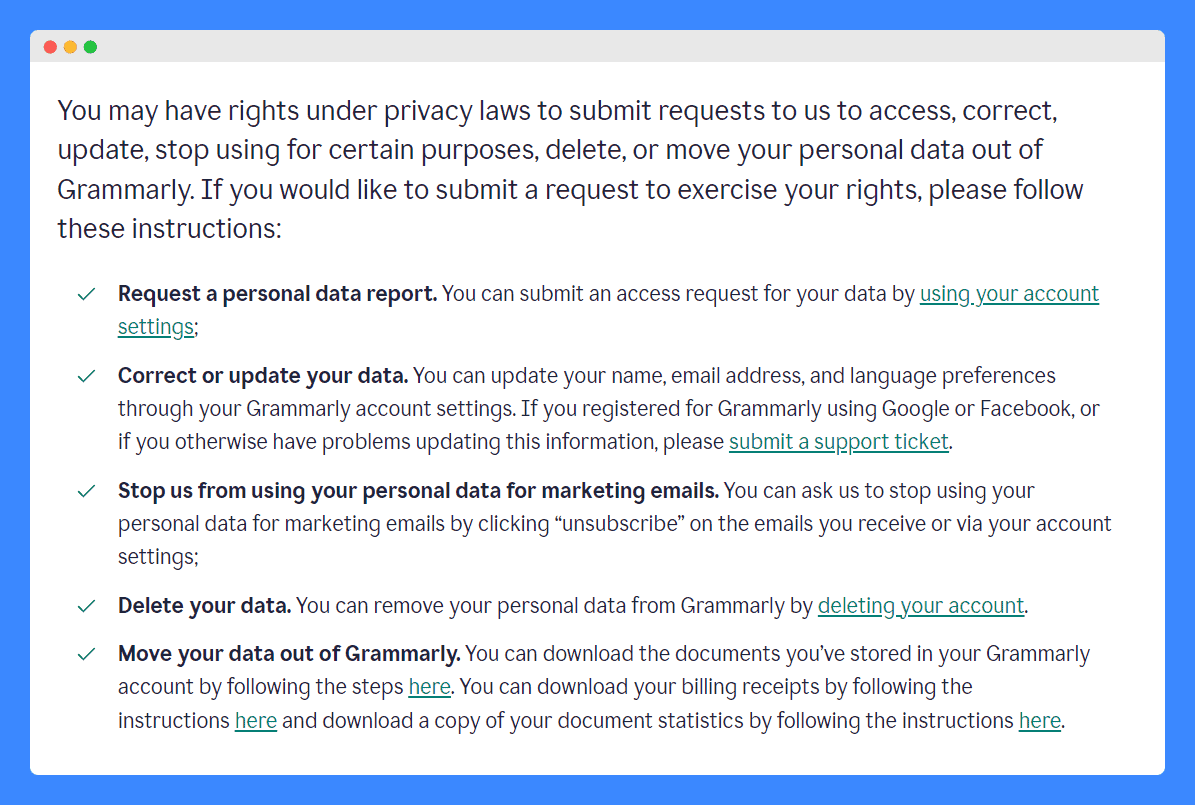
This is particularly important because Grammarly uses email marketing to send updates, promotions, and product information. By giving users control over their data, they show their commitment to respecting user privacy.
Healthline
In its privacy policy, Healthline explains how it handles marketing communications with users, particularly through email.
At the same time, the policy makes it clear that users have control over these communications—they can easily opt-out by following the “Unsubscribe” instructions in the email.
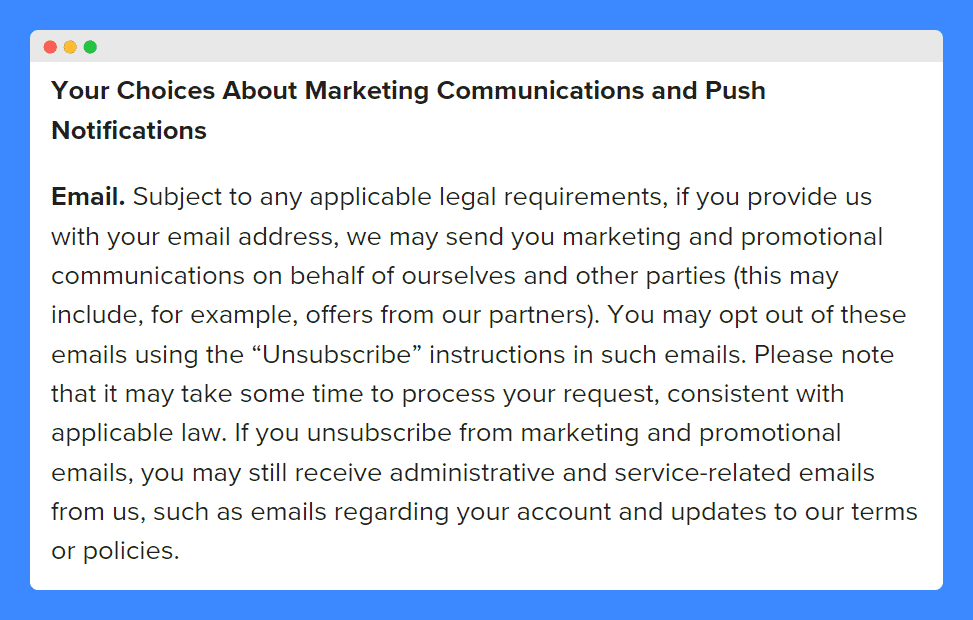
That said, even after opting out of marketing emails, users will still receive important account or service-related emails. This approach balances promotional outreach with respect for user preferences.
Shimano
Shimano provides a great example of transparency in how they handle email marketing. What stands out is the clear explanation of how they use customer contact information for newsletters and promotional emails, including offers from business partners.
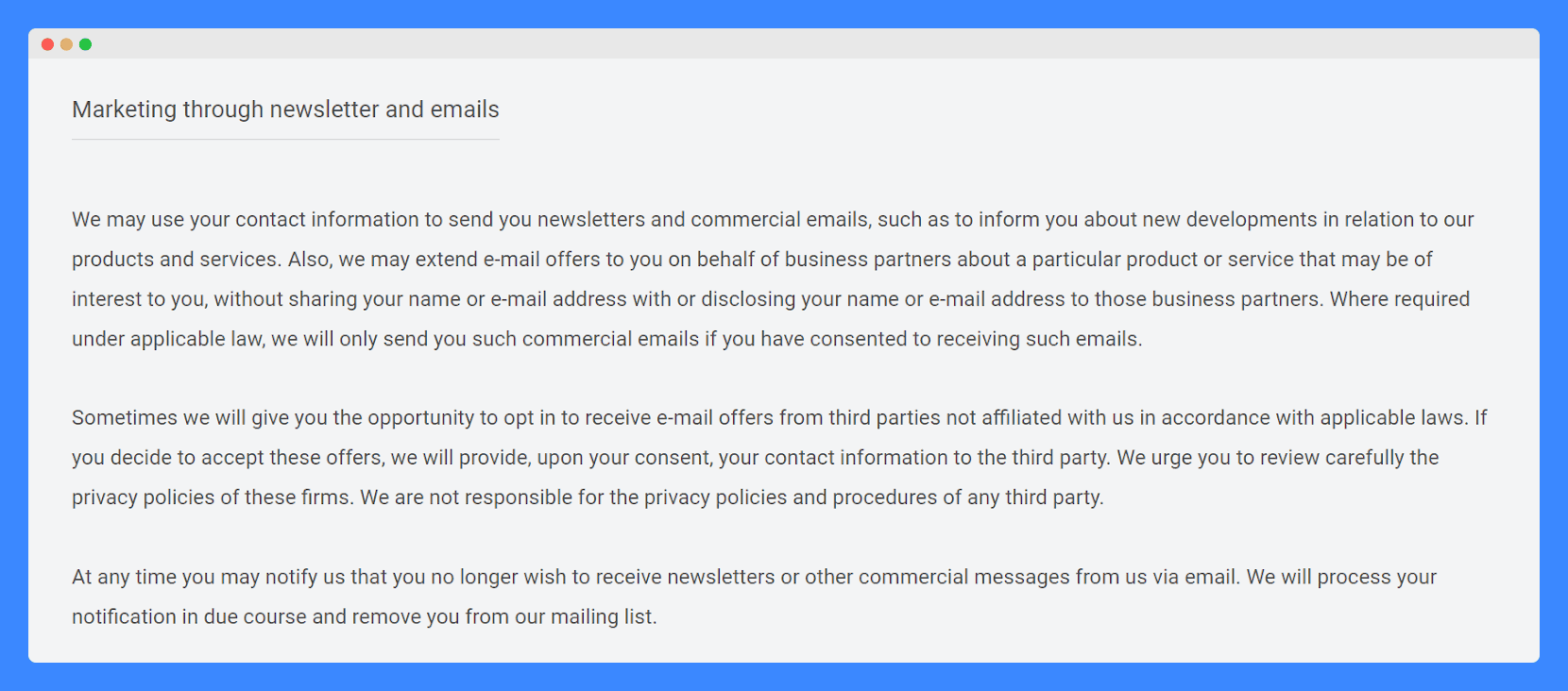
Importantly, they assure customers that their contact details won’t be shared with those partners unless explicit consent is given.
Shimano also emphasizes compliance with applicable laws, requiring customer consent before sending commercial emails and offering easy opt-out options.
Privacy Policy Email Marketing Clause Template
To help you get started with creating a clear and compliant policy, I’ve put together an email marketing clause template for your privacy policy that you can easily customize to fit your business.
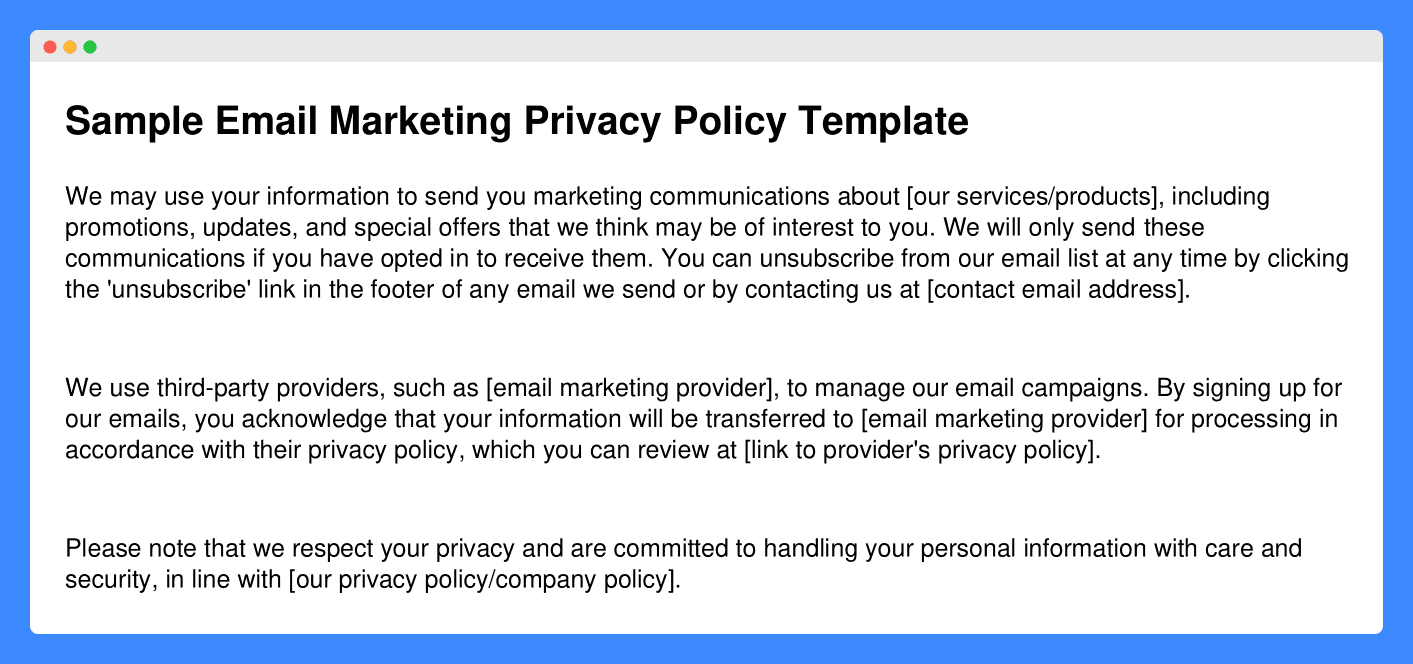
Use this template as a foundation, making sure to adjust it based on your specific practices and legal requirements.
Frequently Asked Questions
Is it mandatory to have a privacy policy for collecting email addresses?
Yes, it’s generally required to have a privacy policy that outlines how you collect and use data like email addresses. This ensures transparency and compliance with privacy laws like GDPR and CCPA.
Do third-party email clients require a privacy policy email clause?
Yes, third-party email clients typically require a privacy policy email clause. This ensures that you and the third party are transparent about how email data is handled and protected from misuse.
Do I need a privacy policy on my emails?
Yes, you need a privacy policy linked in your emails to inform recipients how their data is collected, used, and protected. This is crucial for transparency and to comply with privacy laws like GDPR.
Do I need separate privacy policies for email marketing and transactional emails?
No, you don’t need separate privacy policies for email marketing and transactional emails. However, your privacy policy should clearly differentiate how personal data is used for each type of email.
How should I explain data collection and usage in my email privacy policy?
Explain data collection and usage by detailing what information is gathered and how it will be used. Privacy laws require transparency, so be clear about marketing, analytics, and sharing practices.



